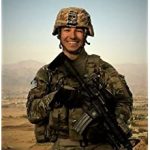Student Veterans and the Coronavirus

Student veterans are older, are more likely to be married, have kids, be consumed by PTSD and struggle with isolationism. Enter nationwide pandemic. Shut down schools, gyms and introduce a myriad of stress and financial issues. Now take that isolationism, PTSD, those issues and amplify them to a population that already has high rates of suicide.
Student veterans already feel out of place in modern classroom environments and rely on college for healthy social interactions. The virus has stripped that away and relegated America’s student veterans to online learning, an unfamiliar domain. Student veterans are going to have challenges learning at home with kids, spouses, online learning, depression and PTSD. The bottom line is, some college students across America are partying it up during this pandemic, but this is a high-risk situation to a population already inundated with potential red flags. Right now is a dangerous time for our student veterans.
The military is one of the most highly structured and rigid environments in the world.
Student veterans struggle with the unstructured nature of normal college learning, being accustomed to military learning. The introduction of online learning is especially disorienting. This isn’t a crowd that’s used to google classrooms like the high schooler students of today. Veterans are used to experiential learning, let’s face it, you can’t learn to shoot a gun with a textbook or computer screen. That’s how the military learns, repetition and training; that’s also how veterans learn when they reach the college classroom.
Veterans are often skeptical about online learning. Now we have to login on computers which many of us don’t have and instead rely on our educational institutions for its libraries and computer labs. Many student veterans are more at home in austere environments like Iraq and Afghanistan and feel out of place on college campuses. Now conducting online learning that out of place feeling has intensified. That feeling of being out of place and not belonging is an enormous reason why veterans drop out of college. This pandemic, if not handled correctly by academic institutions, will lead to a substantial drop out rate by student veterans across the country. Inevitably, these dropouts will lead to higher rates of depression, financial problems and suicide.
Online learning isn’t going to live up to its potential with student veterans this semester.
We should anticipate adaptability issues from student veterans, accessibility problems, technical troubles, motivation struggles and time management headaches at home. Veterans learn by doing and won’t learn at home on the couch. Veterans go to college often relearning how to be a civilian. It takes time to shake off the military mentality and adjust to civilian life. College gives student veterans time to adjust before being thrust into the working world and the social aspect of college is imperative for veterans.
Online education will not provide the outcome that student veterans need in their learning and won’t set them up for success after. The disruption the virus created was unforeseeable but its handling must be done by schools with special consideration for student veterans. This is what student veteran offices at colleges were created for, to give students who feel out of place at college a home and in order to protect our student veteran population, it’s time to step up.
Veterans kill themselves at high rates because of two reasons, the loss of purpose and loss of community leaving the military. It can be difficult to be apart of a team, working together and then lose that in the chaotic civilian world. In the military, everyone is on the same team, but it doesn’t always feel that way in civilian life.
During this time, our student veteran groups and veteran organizations across the country are of vital importance to keep veterans in school through this semester and into next year. In my book, Combat To College, I lay out strategies that student veterans can use to be successful in the classroom. The key component to student veteran success is that they need to be in the classroom! This is an unprecedented event, and everyone is focused on solely protecting student veteran benefits, but we must not forget about the student veterans themselves.

John Davis
John H Davis is a combat veteran who served in Operation Enduring Freedom in Afghanistan. He is the author of Combat To College and holds a BA in History from St. Joseph’s College in New York. He has served as a Student Veterans of America officer and currently is a graduate student at Harvard.
